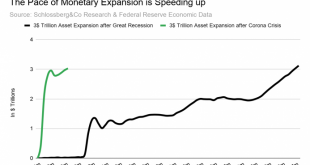On Wednesday, a mob apparently composed of Trump supporters forced its way past US Capitol security guards and briefly moved unrestrained through much of the capitol building. They displayed virtually no organization and no clear goals. The only deaths were on the side of the mob, with one woman—apparently unarmed—shot dead by panicky and trigger-happy capitol police, with three others suffering non-specific “medical emergencies.” Yet, the media response has been to...
Read More »Why the 2020s Won’t Be like the Roaring 20s
The 1920s featured political détente, debt liquidations by prior consumer price inflation, an introductory stalling of monetary inflation, a German economic miracle, and a broad-based technological revolution. The 2020s have none of these. This Audio Mises Wire is generously sponsored by Christopher Condon. Narrated by Michael Stack. Reincarnation of the Roaring Twenties—one century on from the 1920s—is the lead speculative narrative this new year on Wall Street,...
Read More »Hayek, Friedman, Buchanan: The Villains of “Neoliberalism”
In the Ruins of Neoliberalism: The Rise of Antidemocratic Politics in the West by Wendy Brown Columbia University Press, 2019 viii + 248 pages Wendy Brown, a well-known political theorist who teaches at UC Berkeley, does not like Friedrich Hayek very much. She in part blames him and others as well, including Milton Friedman and James Buchanan, for policies that have led to the bad state of the world in general and America in particular today. In the Ruins of...
Read More »2021: Welcome to Post-persuasion America
Mobilization and separation, not persuasion, is the way forward. Original Article: Welcome to 2021 in post-persuasion America! I first heard this term used by Steve Bannon, architect of the surprising 2016 Trump campaign, in a PBS Frontline documentary titled America's Great Divide. Speaking way back in the precovid days of early 2020, Bannon asserted the information age makes us less curious and willing to consider worldviews...
Read More »California Now Wants to Tax People Who Live in Other States, Too
California’s government has become infamous for abusing its citizens, from steep taxation to burdensome regulations to arbitrary covid impositions. But less noticed is how it is also trying to abuse other Americans as well. As reported in a December 28 Los Angeles Times editorial, the California Department of Tax and Fee Administration (CDTFA), which oversees sales and use tax collections, is trying to retroactively impose sales taxes on out-of-state retailers as far...
Read More »Double Standards, Reparations, and War Crimes
Joan Wallach Scott, a historian who is a professor emerita at the Institute for Advanced Study in Princeton, has come up with a most valuable insight. She is decidedly not “one of us,” but her insight makes her sound as if she might be. She says, the notion of the judgment of history rests on a progressive linear view about the necessary superiority, in every domain, of the future as compared to the past, but also—crucially—about the state as the political embodiment...
Read More »The Result of “Too Much Money”: Asset Price Inflation and Inequality
In the eyes of many, covid-19 has truly accelerated things. Tech aficionados have been rejoicing as virtual meetings, Zoom calls, and overall digitization within companies have seen a serious boost. At the same time, the corona crisis has intensified another contemporary development that people generally don’t really care about: today’s ongoing expansion of the money supply. Although monetary policy had been ultraexpansionary even well before the virus hit the world,...
Read More »2021: Predictions for the New Year
There's no reason to assume 2021 will bring a reversal of 2020's trends. Many of the fights that began in 2020 are likely to intensify in the new year. Be sure to follow Radio Rothbard at Mises.org/RadioRothbard. You Might Also Like American Police Forces Were Created to Fight Rioters. But Police Probably Made Things Worse. 2020-07-29 Whenever the vicious portion of population shall be...
Read More »The Problem with Mandatory “Socially Responsible Investing”
The term environmental social governance (ESG) investing is relatively new. As described in Forbes, [An] approach that is slowly on the rise is ESG activism, where an activist fund will take a position in the security of a company with the aim of campaigning to make its business better in terms of governance, less environmentally unfriendly and more socially responsible. But the concept of morally selective investing is not totally new, as it gained a good deal of...
Read More »Why the Marketplace Is Not a Zero-Sum Game
Twenty-twenty marks the twenty-fifth anniversary of a book that has had an expanding influence on the public conversation about market competition. Robert Frank and Philip Cook’s 1995 The Winner-Take-All Society argued that there are an increasing number of markets in which small differences in performance give rise to enormous differences in rewards. As John Kenneth Galbraith described it in a review of that book, the consequence is that “the one who wins gets it...
Read More » Swiss Economicblogs.org
Swiss Economicblogs.org









